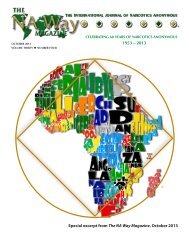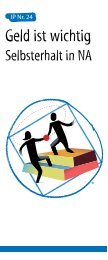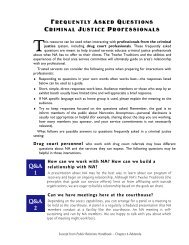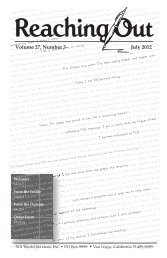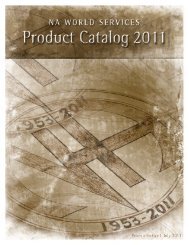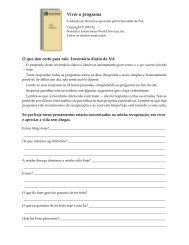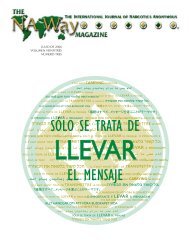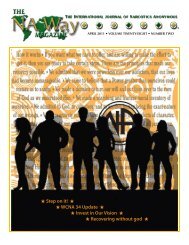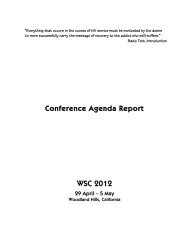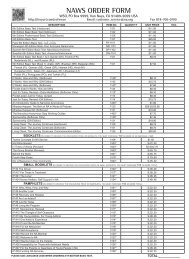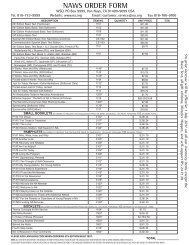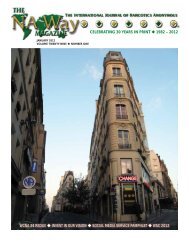Public Relations Handbook - Narcotics Anonymous
Public Relations Handbook - Narcotics Anonymous
Public Relations Handbook - Narcotics Anonymous
You also want an ePaper? Increase the reach of your titles
YUMPU automatically turns print PDFs into web optimized ePapers that Google loves.
P u t t i n g y o u r p l a n i n t o a c t i o nInteracting with healthcare professionalsHealthcare professionals can include physicians, psychiatrists, psychologists,psychotherapists, pharmacists, dentists, and nursing professionals. The area service committee may consider hosting a public relations roundtablewith healthcare professionals. These roundtables can be an opportunity for localareas to exchange information with healthcare professionals and can allowprofessionals to identify what they need from NA. Trusted servants can also usethese roundtable discussions to dispel stereotypes about the NA program. Trusted servants can educate healthcare professionals about NA’s successes.Providing statistics on the number of members around the world, the differentcountries where NA meetings are held, and the diversity of NA’s membership(such as the economic, racial, and professional range in members) is likely to beparticularly meaningful in healthcare settings. Professionals are often interestedin outcomes. NA’s membership survey can be used as support material. Trusted servants have an opportunity to share with medical professionals thatNA is a program of complete abstinence and that our members often havespecial concerns about physicians prescribing potentially risky medications. Atthe same time, trusted servants can educate NA members that it isinappropriate to interfere with medication that has been prescribed to othermembers by healthcare providers. We can educate our members about thedangers of substituting one drug for another and we can educate the medicalcommunity about complete abstinence, but ultimately this is an issue betweendoctor and patient. Healthcare professionals such as physicians and dentists interact with a variety ofpeople who use drugs. Following a presentation, trusted servants could suggestthat physicians provide patients who they think may have a drug problem withthe pamphlet Am I an Addict? Trusted servants could explain that the questionscontained in that pamphlet are the questions members ask themselves whenfirst coming to NA. Trusted servants can be trained to dispel myths about NA’s name. Surveyinformation outlining the range of drugs used by NA members can illustrate thatNA is not just for those addicted to narcotics like heroin.D i s c u s s i n g a n d a d d r e s s i n g k n o w n c h a l l e n g e si n h e a l t h c a r e s e t t i n g sHarm reductionHarm reduction is a treatment approach that may not promote abstinence yetclaims to reduce harm to the individual and the community. NA is a resource thatcan be utilized within many treatment regimens and complements many professionaltreatment models. NA has no opinion on the effectiveness or validity of a specificmodel such as harm reduction. If requested, members can explain that NA is not inconflict or competition with approaches like harm reduction. <strong>Public</strong> health officialswill often use statistical data to support various treatment models, including harmreduction. Trusted servants can explain that NA does not have statistical data thathas been researched. Rather, NA uses self-reported information that is representedin the NA Membership Survey. Some areas and regions have conducted researchthat shows members getting jobs, returning to school, and no longer committingOctober 2006 | PR <strong>Handbook</strong> | 77



